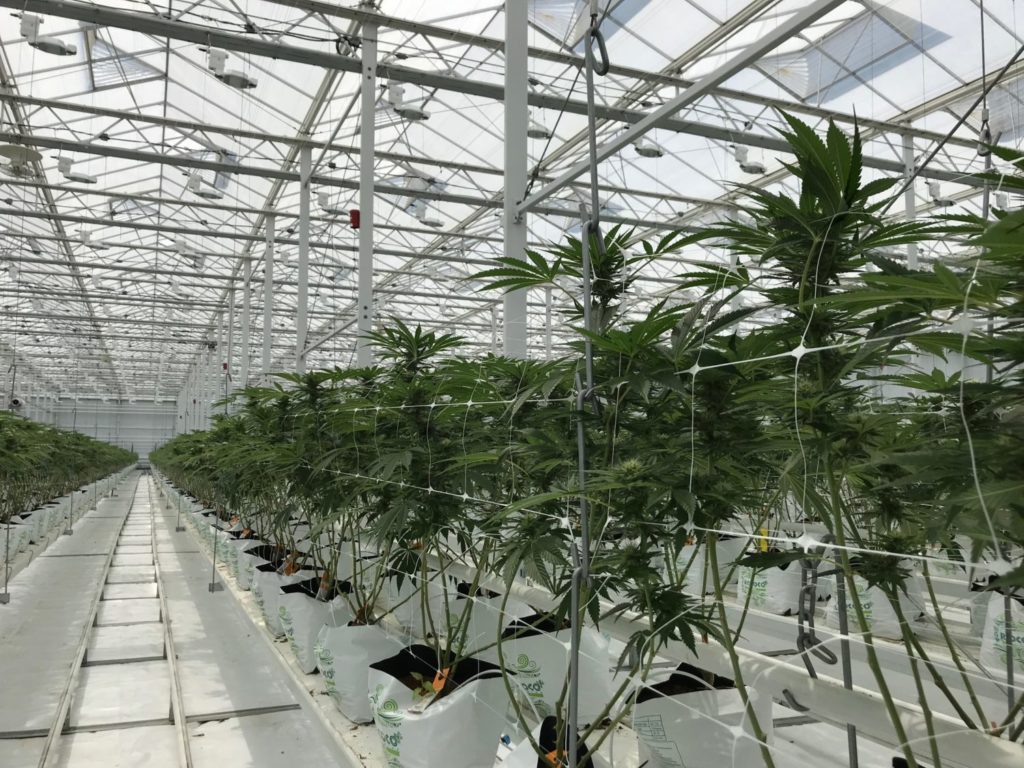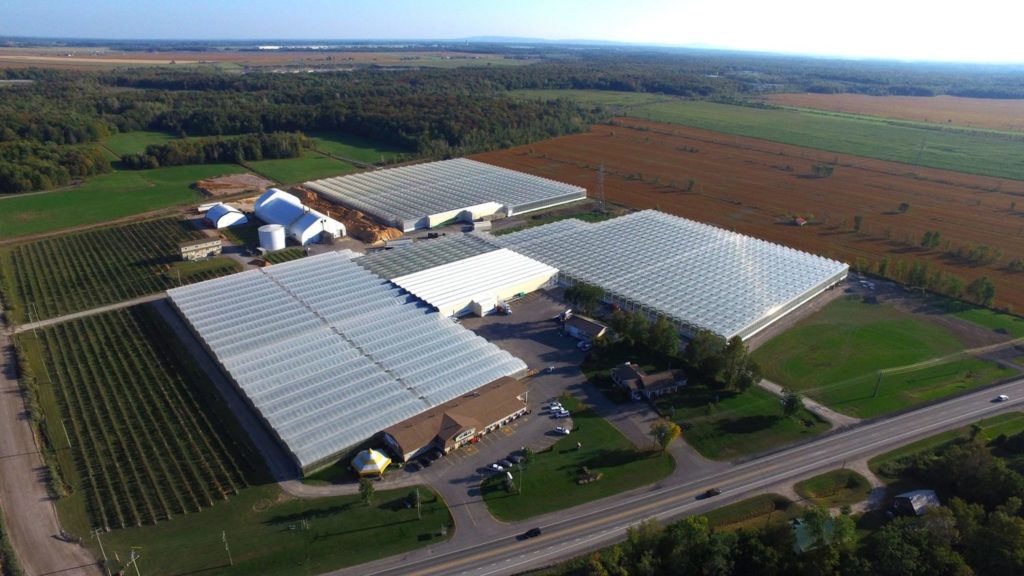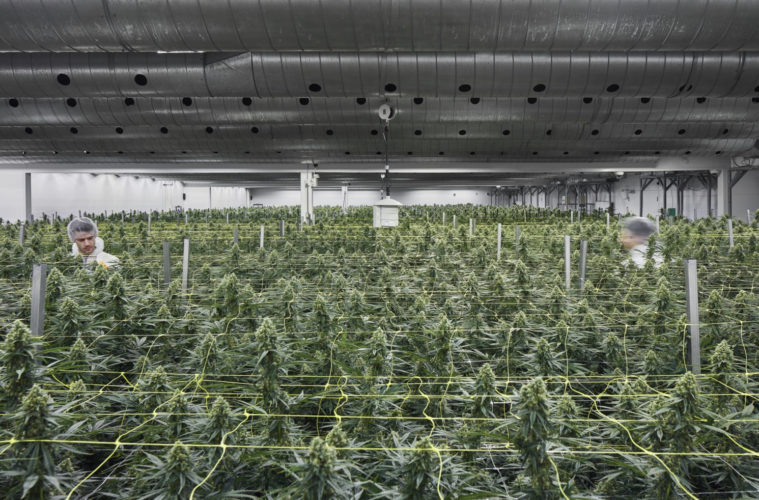Revenue is up across the board except for the actual pot at world’s biggest cannabis company Canopy Growth
As investors in Canopy Growth started to see more tangible results from January’s change in leadership, the stock price bumped up a bit. But there is still plenty of work to be done to get back to the highs of 2018 that saw the stock valued at more than double its current level. That being said, with quarterly revenue up 22% from this time last year, it would seem things are heading in the right direction.
We talked with Canopy’s CEO David Klein about the numbers, and what it’s like executing his plans around the company’s restructuring after taking over just as the pandemic got on the world’s radar in January.
As for starting in the pandemic, “you wouldn’t plan it that way,” Klein told L.A. Weekly. Regardless, he and the rest of Canopy’s leadership continue their efforts to turn the business into a real-deal sector-dominating consumer product goods company and not just the flashy headline-grabbing giant still working to get its feet under it for the long run. Klein believes it will take a lot of discipline around understanding the current cannabis consumer beyond good pot –specifically the millions of people he believes don’t yet realize they love weed.
“So how do you build the muscle to understand those varying consumer sets? And then develop products for them, and then deliver on those products in an AG environment. There is variability in agriculture-based products,” he said.
Much of focus in recent months has been on continuing to gain insight into major markets around the globe. Since this time last year, Canopy’s international sales have almost doubled. The U.S. CBD market and German medical cannabis markets are particular spots the company made solid moves.
We asked Klein if he thought COVID-19 boosted sales or hindered progress? He said pantry loading in March, at the end of the previous quarter, played a factor but things got wild when they had to completely close shop for a bit.
“We shut down our stores, our company-owned stores, just because we weren’t sure we could keep our employees safe and we just said we’re not going to make a mistake on this,” Klein said. “A lot of our competitors didn’t, but you know we were able to get things back open by the end of April. Over the last couple of weeks, our stores are now performing as they did at pre-COVID levels. But it took a while to bounce back.”
Klein noted one of the cool things that came out of everything was Canopy’s rapid advancement across various eCommerce platforms amid the pandemic.
As Klein got to the importance of the flower, we stopped him to ask what it’s been like trying to understand what a high-end flower looks like at scale, compared to more craft grows with fewer lights. A low point of the generally positive earnings report was an 11% dip in sales to the Canadian recreational market. Since dry bud is traditionally the driver of the market, how does Canopy plan to make its flower more appealing to those consumers who may have moved on to other companies or back to the underground marketplace, where there is plenty of great pot?
Klein replied by comparing it to the wine industry: “You know you have guys that produce larger volumes and then you have the guys that make really high-end products. I think there’s a way to have a symbiotic relationship between the organizations that do that.” Klein also spoke to a willingness to compartmentalize. You don’t have to do everything in the same place if you’re doing it right. “The process is driving quality versus just driving quantity.”


Klein believed a year-and-a-half ago it was just cool that you could sell cannabis in a legal framework. “But the consumer is a lot smarter than that. So we have to deliver improved quality.”
Part of addressing the quality of their flower was a complete revamping of their drying and curing process. That’s always a great start since plenty of great pot doesn’t get ruined until after it gets harvested. Canopy is also experimenting with a lot of genetics right now and on the hunt for winners through their various cultivation setups.
“I think there’s a lot of ground to be covered but we have to start with quality, as defined by the consumer. Not as defined by, you know, somebody in a lab coat in one of our production facilities,” Klein said.
The conversation shifted toward the turtle’s pace of U.S. federal cannabis policy reform. We asked Klein how important it was for Canopy to get its footing before more competition eventually comes online south of the border. We also asked about Canopy’s recent moves to eventually enter the U.S. THC market.
“It’s a big market, and make no mistake about it, if you want to win in cannabis you’re gonna have to win in the U.S., over time,” Klein replied. “But you know for us, we’re using Canada as a way to get our model right and we’ve clearly made some mistakes. We think we’re correcting those.”
Klein said as the company continues to push forward in creating new products, they’re thinking with a very North American mindset as a whole for products that appeal to all. “I want to develop products that would appeal to the consumers in the U.S., and we’ll try them out in Canada and we’ll see, you know? Do we have to tweak them a little bit?”
Klein pointed to the variables around form factor and dosing where they can get a lot of the work done in Canada.
“Also you know on that [U.S.] regulatory thing, we’re working pretty hard on the government relations front too. Like I know the MORE Act will come to the floor, most likely in September,” Klein said.
The MORE Act is a legalization bill with a lot of community reinvestment and restorative justice measures worked in. Its chief sponsor in the Senate is the new Democratic vice-presidential nominee Kamala Harris. The bill served as one of the moves to deice her relationship with the cannabis world after years as a prosecutor. Needless to say, we thought the concept of a vice-presidential nominee filing a legalization bill two months before the election seemed pretty wild.
“It is pretty wild, but there’s momentum in the House and they’re now starting to ask for our thoughts on the regulatory framework,” Klein said. “And working with Constellation Brands, we’ve crafted a view. Everybody, I’m sure, has their own view, but I think anything can happen.”
Klein went further to say the emerging U.S. industry could have a similar impact as alcohol did coming out of the Great Depression. “Ending alcohol prohibition created jobs and tax revenue. We can kind of do the same thing in the cannabis space,” he said.
During his 14 years in the beverage industry, Klein saw a lot of drinks move off shelves. We asked if he got a kick out of the excitement around moving a million pot drinks compared to the scale at which he previously sold beverages?
“The beer market in Canada sells about 240 million cases, which is just under 6 billion units,” said Klein, putting it into perspective. “So we’re all talking and high fiving right after we shipped a million units. A million of these are cool, but the other guys sold 6 billion of these. What is the scale of our opportunity here?”
Canopy still has some doubters to the program given their rough 2019. Some would say even with the numbers trending in the right direction, and getting costs down and net revenue up, the previous poor performances of Canadian companies make it hard for anyone to be in the public markets right now, whether they are profitable or not. We asked Klein about his take on that sentiment.
“There’s nothing easy about being a publicly-traded company in an industry that’s developing,” he replied. “So when you think about what happened, nobody was talking about legal cannabis and then suddenly it exploded on the scene. A whole bunch of investors threw money at these LPs in Canada. They overbuilt their capacity for a market that we still might get to but we didn’t get to it quickly. The provinces lagged a little bit so the market didn’t come. It will arrive.”
Klein argues that if you judge the business from day one to today, “you know you would say that this is a struggling set of businesses that are in a struggling industry. I think if you look at where some of the players are today, and I’ll focus solely on Canopy, I mean we’re sitting here with a business that we see the path to profitability. We see and maybe even believe more in the market size now than when the investment money came in. … We’re trying to fix the things we know we need to get better at like understanding the consumer and improving our quality.”
Klein argued that even though the corrections are ongoing, “I’m sitting here today with $2 billion in cash on my balance sheet. So I’m feeling like, should we have some haters that invested over the last couple of years? Yeah, I get it. We’re not the first industry that’s kind of gone through that you know irrational exuberance cycle to kind of almost a bust cycle. But I don’t think you can deny that the industry is coming.”
Klein closed by noting that when he takes a look at the portfolio of intellectual property Canopy has, the talent they have in some of the brands, production assets, and ways to get into the U.S. and such, “I feel really, really bullish on where we sit today.”
Advertising disclosure: We may receive compensation for some of the links in our stories. Thank you for supporting LA Weekly and our advertisers.

